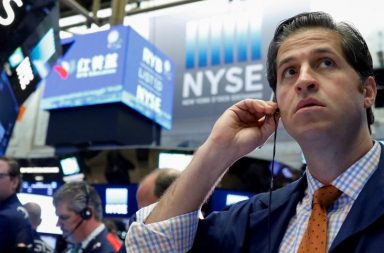On Monday, U.S. stock index futures added to their losses with Dow futures losing over 300 points, while bond yields continued their climb. Yields on 10-year U.S. Treasury debt reached a four-year high of 2.885 percent, gaining nearly 7 basis points on Friday.
Rising bond yields results in higher borrowing cost for companies as well as another investment option for traders. On Friday, Wall Street’s three major indexes recorded their largest weekly losses in two years. The S&P 500 and the Dow saw their worst weeks since January 2016 and the Nasdaq since February 2016.
Friday’s U.S. payrolls report revealed that wages were growing at their fastest pace in over eight years, adding to the concern that inflation and interest rates would both accelerate faster than anticipated. Three rate hikes for this year have been priced into the market, but if the economy and corporate earnings continue to advance, a fourth increase becomes possible. On Monday, Jerome Powell will be sworn in as the new Federal Reserve Chair.
The CBOE Volatility Index, the most commonly followed barometer of expected near-term volatility for the S&P 500 Index, was trading at 18.62, its highest since November 2016.
At 7:12 a.m. EST: Dow e-minis were down 309 points, or 1.22 percent, with 76,519 contracts changing traded. S&P 500 e-minis were down 20.75 points, or 0.75 percent, with 328,542 contracts traded. Nasdaq 100 e-minis were down 61 points, or 0.9 percent, on volume of 73,229 contracts.
Analysts now forecast a fourth-quarter earnings growth of 13.6 percent for the S&P 500, an increase from 12 percent on January 1. Half of the index’s companies have reported so far and 78 percent of them have surpassed analysts’ estimates, according to data. Walt Disney, General Motors and Tesla will report this week.

THE MORNING REPORT
Start your workday the right way with the news that matters most.
Your information is 100% secure with us and will never be shared Disclaimer & Privacy Policy
As for stocks, in premarket trading Wells Fargo dropped 9.5 percent after the Fed enforced new regulatory restrictions.
Qualcomm gained 4.4 percent after Broadcom increased its offer to purchase the company and Broadcom shed 1 percent.
Bristol-Myers Squibb was up 2.2 percent after the company reported that a late-stage trial for a lung cancer drug hit its target.
 D. Marie
D. Marie 



